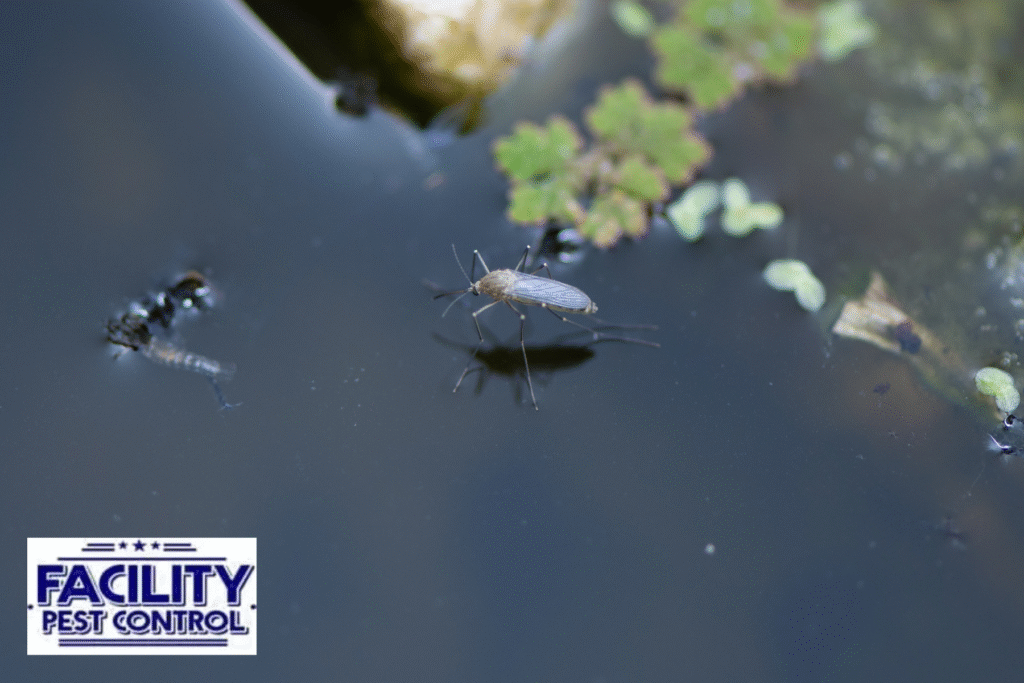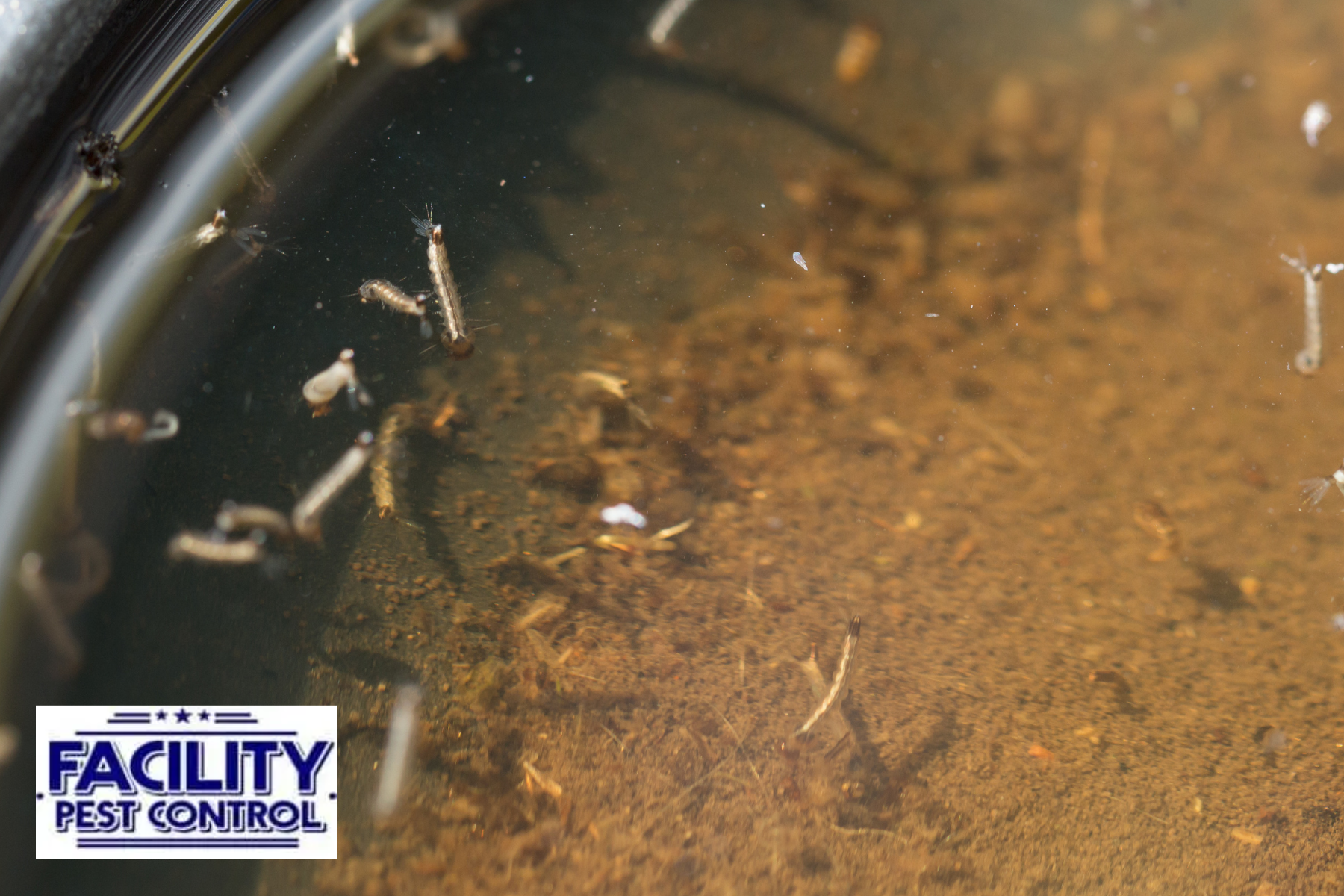Mosquitoes are more than just annoying summertime pests; they’re efficient breeders, especially in areas where stagnant water is present. Understanding the lifecycle of mosquitoes and the role water plays in larval development is essential for homeowners looking to reduce mosquito populations around their properties. Whether you’re dealing with itchy bites or just want to enjoy your backyard in peace, learning how mosquitoes grow and thrive can help you take informed steps toward better mosquito control in Agoura Hills, CA.
The Four Stages of a Mosquito’s Lifecycle
Like many insects, mosquitoes undergo complete metamorphosis, which consists of four life stages: egg, larva, pupa, and adult. Each stage is highly dependent on environmental conditions, especially the availability of water.
Stage 1 – Egg
Female mosquitoes lay their eggs directly on or near water surfaces. Some species prefer floodwater and lay their eggs in moist areas that will eventually flood, while others deposit their eggs on stagnant water in containers, ponds, or puddles. Within 24 to 48 hours, these eggs hatch into larvae, depending on the temperature and humidity.
Stage 2 – Larva
Once hatched, mosquito larvae in water become active swimmers. Often called “wigglers,” these larvae live at the surface to breathe air through a siphon and feed on organic matter and microorganisms. This stage is where mosquito growth accelerates, and larvae molt multiple times as they develop.
This is also a critical time to intervene. Knowing how to kill mosquito larvae before they become biting adults can drastically reduce future infestations. Since larvae must stay near the water’s surface to breathe, treatments that cover the surface or biological larvicides can be especially effective.
Stage 3 – Pupa
After the final molt, larvae transform into pupae, also known as “tumblers.” At this stage, mosquitoes are not feeding but remain active and responsive to light and movement. They continue to live in the water, preparing to emerge as adults. This stage typically lasts a couple of days, after which the adult mosquito breaks through the pupal casing and flies away.
Stage 4 – Adult
Newly emerged adults rest on the surface of the water to dry and harden their bodies and wings. Once ready, they fly off in search of food — nectar for males and blood for females. Female mosquitoes seek blood meals to obtain the nutrients needed to produce eggs, thus continuing the cycle.
Why Water Matters So Much
Mosquitoes cannot complete their lifecycle without water. Even the smallest sources of standing water — such as birdbaths, clogged gutters, flower pot saucers, or even bottle caps — can serve as mosquito nurseries. Warm temperatures and nutrient-rich water further accelerate development, leading to more frequent breeding cycles.
That’s why water management is one of the most effective mosquito control strategies. Draining, dumping, or treating standing water can prevent thousands of mosquitoes from maturing in your yard.
Common Water Sources That Fuel Mosquito Growth
Homeowners may unknowingly provide perfect mosquito breeding grounds. Some of the most common sources include:
- Clogged gutters: Accumulate organic debris and rainwater.
- Toys and outdoor containers: Collect rainwater if left uncovered.
- Birdbaths and pet bowls: These need to be emptied and refreshed regularly.
- Plant saucers: Often overlooked, these are prime locations for larvae development.
- Tarps and covers: Water can pool in creases and folds.
- Old tires or buckets: Hold rainwater for long periods without maintenance.
Being proactive and removing or treating these sources helps disrupt the mosquito lifecycle right where it starts.
Temperature and Lifecycle Speed
Environmental factors, especially temperature, have a significant impact on the mosquito lifecycle. Warmer weather speeds up development. Under ideal conditions, mosquitoes can grow from egg to adult in less than a week. That means even temporary standing water can lead to a surge in mosquito activity in just a few days.
Effective Mosquito Control Solutions
Managing mosquito populations requires a combination of source reduction, biological control, and physical or chemical barriers. Here are some of the most effective options for mosquito control Agoura Hills CA:
- Remove standing water: Empty and scrub containers weekly.
- Use larvicides: These target mosquito larvae in water and prevent them from reaching adulthood.
- Install mosquito traps and In2Care buckets: These attract and eliminate adult mosquitoes and interrupt breeding.
- Fogging and spraying: Useful for targeting adult mosquitoes in foliage and shaded areas.
- Keep yards clean: Trim shrubs and now regularly to reduce mosquito resting spots.
Combining these methods helps reduce both breeding grounds and adult populations, offering better long-term protection.
Why It’s Important to Act Early
If you’re only reacting when adult mosquitoes are already a nuisance, you’re likely one step behind. By focusing on early intervention and preventing larvae from maturing, you can significantly reduce mosquito populations and their associated health risks. Since mosquitoes are known vectors for diseases such as West Nile virus and Zika, mosquito removal and prevention are a public health priority, not just a comfort measure.
Partnering with Local Experts
Working with local professionals gives you access to knowledge, tools, and experience tailored to your area. A professional pest control company understands the behavior of regional mosquito species and can create custom strategies for effective treatment and prevention.

About Facility Pest Control
Facility Pest Control is a trusted, family-owned business based in Agoura Hills, CA. Our mission is to protect homes and businesses through effective and eco-conscious pest management solutions.
Our general pest control services cover ants, spiders, crickets, roaches, earwigs, and wasps, with optional treatments available for more complex pests like fleas, ticks, and hornets. Whether you prefer monthly, bi-monthly, or hybrid service schedules, we customize plans that fit your lifestyle and property needs.
Our mosquito control in Agoura Hills, CA includes fogging, surface spraying, and the use of In2Care mosquito buckets to help prevent the lifecycle of mosquitoes before they start. Our trained technicians target mosquito breeding zones to stop larvae development and protect your home from future outbreaks.
We use family- and pet-safe products and offer comprehensive interior and exterior pest treatments. From attic to yard, we ensure every part of your home is protected. Trust Facility Pest Control to deliver dependable service with a personal touch.




